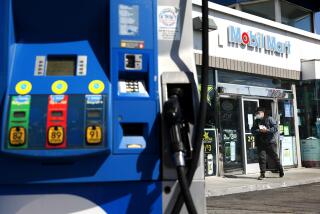Exxon Spill Leaves Mark on Oil Industry
- Share via
SAN FRANCISCO — Haunted by the Exxon Valdez oil spill and a recent rash of refinery accidents, the oil industry has embarked on an unprecedented round of soul-searching.
Oil executives meeting here the past few days recognize that their credibility has taken a severe beating lately, and they expect to continue paying dearly for their mistakes.
To recoup, leaders say, the oil industry must seize the initiative in developing regulations regarding clean air, oil spill cleanups and alternative fuels--or risk having less palatable rules forced on them by an unsympathetic public and Congress.
The oil industry must also work harder to get its message across to both the public and legislators, as well as make sure that a Valdez-like spill does not occur again, Transportation Secretary Samuel K. Skinner told the American Petroleum Institute during the final day of its meeting here Tuesday. “You can’t afford a major mistake,” he said.
Allen E. Murray, president of Mobil Corp. and the institute’s newly elected chairman, summed it up: “This is the decade of the environment, no doubt about it, and it’s going to reflect in everybody’s activities--individuals as well as companies.”
Environmental concerns are behind recent industry projects to fund and research oil spill cleanup methods and to study low-emission gasolines. And they will surely drive capital spending plans for the next year as much as the price of crude oil, executives said.
As part of the industry’s apparent new flexibility in such areas, outgoing API Chairman Richard M. Morrow, who is also chairman of Amoco Corp., on Tuesday took to heart criticism by William K. Reilly, administrator of the federal Environmental Protection Agency, that a plan to spend $35 million on oil spill cleanup research over the next five years is inadequate.
“If it appears additional research activity is appropriate, I’m sure it will be funded,” Morrow said.
On Monday, Reilly also urged oil companies to cut plant emissions voluntarily--reminiscent of his plea earlier this year exhorting chemical companies to do the same thing.
“Such an industrywide voluntary program would go a long way toward changing the tone of the national debate over clean air,” he said Tuesday.
Not everyone was buying the industry’s new line. One prominent environmentalist dismissed the industry’s efforts as “worse than lip service.”
“They are speaking in stentorian tones with trumpets, saying that, ‘yes, we’ve got religion and now we are strong and we are powerful and wealthy, and we can take care of the problem and are doing it,’ ” said Michael Fischer, executive director of the Sierra Club. “And they can’t.”
But Kenneth T. Derr, chairman of Chevron Corp., appeared to take the new mood seriously by openly questioning the adequacy of preparation for the Valdez cleanup.
“We (oil companies) weren’t able to contain it, and I think that was a serious problem on the credibility of the industry,” especially after companies had promised no such spill could every happen, he said. “The effects of this accident have permeated everything that’s happened in energy this year, and most of it has been negative,” he added.
Lawrence G. Rawl, chairman of Exxon Corp., which is conducting tests to assess the remaining oil spill damage in Alaska’s Prince William Sound, defended his company’s much-criticized cleanup.
But he acknowledged that the spill gave momentum to proposed legislation recently passed by the House of Representatives that would impose strict liability on companies for spills. “That spill . . . coalesced a lot of groups,” he said.
Some executives argued that heightened environmental concerns have created new business opportunities. But others, like Murray, pointed out that they have also locked out development by his and other companies of leases off Florida and the Gulf Coast.
Skinner estimated that such areas could remain off limits for as long as five years.
“This cannot be tolerated much longer. . . . These places have to be developed,” Murray said.
Unless they are, oil imports can only increase, he said. “You must worry about declining U.S. (oil) production from the point of view of economics,” he said.
Because of the increasing internationalization of U.S. oil companies, “I’m not concerned about the security aspect,” he said. “If Japan can survive with 100% imports, we can survive with 50% or 60%. But would I rather have 20%, of course. Are we ever going to be 100% self-sufficient? No.”
More to Read
Sign up for Essential California
The most important California stories and recommendations in your inbox every morning.
You may occasionally receive promotional content from the Los Angeles Times.













